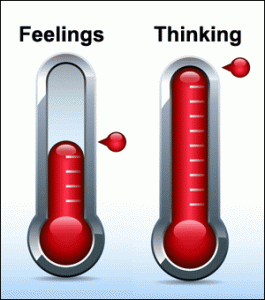Football Fans need to keep their cool this Superbowl Sunday
If you are attending a Superbowl party this weekend that includes fans from both teams you might want to bone up on your Anger Management skills. It is important to remember that this is a game for entertainment but the addition of rowdy participants and alcohol could cause some tempers to escalate. Keep these facts in mind if you feel your level of anger rising.

 Definition of Anger
Definition of Anger
Anger is seen as the emotional response to actual or imagined provocation or threat. In these pictures, the railroad tracks represent anger, while the train represents aggression, or the physical response to anger.
Purpose of Anger
Anger, when it is controlled can provide the energy needed to solve a problem, stand up for one’s rights and help overcome obstacles to goals that have been temporarily blocked. However, when anger leads to aggression, anger is being misused.
Definition of Aggression
Aggression in relationships is any behavior or action intended to harm, control, or dominate others. Although anger can lead to aggression, most people do not resort to physical or verbal aggression.
How is it Different?
Aggression differs from anger because of the severity, intensity and long-lasting nature of it’s consequences.
Are We Born Aggressive?
Aggression is learned socially. Most aggressive behaviors are learned early in life and passed on from one member of a family to another. Other times aggressive behaviors are learned in one’s environment or culture.
Instrumental or Planned Aggression
Aggression without anger can be seen as a desire to exert control over another person rather than as a need to express anger. Examples include robberies, gang violence, organized criminal activity, and terrorism. In intimate partner relationships, making threats of violence, destroying personal property, controlling social contacts and taking control of financial resources are examples of a need for control.
Types of Aggression – “All I did was push him/her out of my face”
Physical Aggression or abuse includes: Pushing, shoving, hitting, slapping, grabbing, restraining, blocking exit, using a weapon, spitting, bumping into, biting, unwanted sexual or other physical contact.
Psychological Aggression or abuse includes: Name-calling, criticizing, threatening to harm self or others, threatening with a weapon, making unwanted phone calls, going to a place where someone works against their wishes, unwanted contact, controlling contacts with friends, checking up on someone, showing up at a person’s residence against a court order, calling a person stupid or other put downs, using body language to intimidate or scare them.
 Direct Aggression
Direct Aggression
Direct physical, psychological or verbal acts.
Indirect Aggression (Passive-Aggressive)
Indirectly expressing anger by forgetting an important date or event. Being late, making a sarcastic comment, playing practical jokes, intentional inefficiency or “dragging your feet.” Indirect aggression is often accompanied by resentment.
Reactive Aggression
Self defense is an example of becoming aggressive for self-preservation. In determining your level of defensive aggression, you must consider the risks and consequences of defensive aggression.
Rage Reactions
Some persons may have such poor control over their anger, that they “see red” and lose control over aggressive feelings, not remembering what triggered them. These persons may have brain functioning problems and do not plan their reactions at all. They may require medical treatment in addition to anger management counseling.
ALL classes developed and monitored by Tom Wilson, a Licensed Clinical Professional Counselor who is also a Certified Alcohol and Substance Prevention Specialist. Tom is the author of “Taming Anger and Aggression”, an anger management program which has been taught to hundreds of people at the counseling center over the last twelve years. He specializes in adapting evidence-based substance abuse prevention programs for delivery through the web and other electronic media.
REGISTER FOR
8 Hour Online Anger Management Class $150.00
12 Hour Online Anger Management Class $225.00
16 Hour Online Anger Management Class $300.00
32 Hour Online Anger Management Class $600.00






















